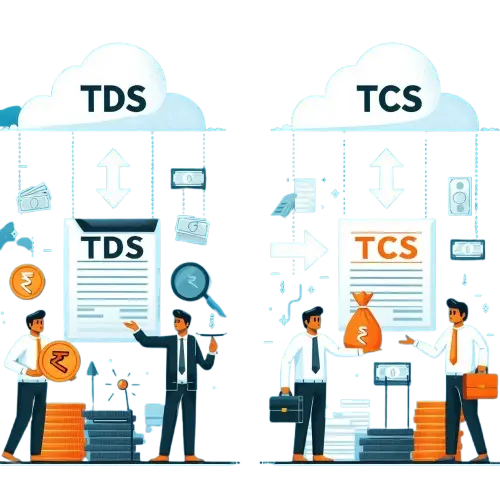
Your Comprehensive Guide to Compliance
*Free & Easy - no hidden fees.
![]() Call For Demo 9168696091/92/93
Call For Demo 9168696091/92/93







TCS, or Tax Collected at Source, refers to the tax that sellers are mandated to collect from buyers during transactions involving specified goods, products, or services. This tax is then remitted directly to the government, ensuring transparency and accountability in commercial exchanges.
TCS (Tax Collected at Source) and TDS (Tax Deducted at Source) are very important parts of the Indian GST taxation system.
| Parameters | TDS | TCS |
|---|---|---|
| Applicability | TDS is deducted from payments made for goods and services. | TCS is collected by the seller at the time of sale of specified goods. |
| Transactions Under | Interest, rent, salaries, etc. | Sale of goods from nature like, minerals, and forest produce, tendu leaves. |
| Due Dates | TDS must be deducted and paid quarterly by 7th of the next month. Except for March month it is the 30th of April of the next Financial Year. | With TCS monthly deposits must be made within seven days of the end of the month and quarterly filing. |
| Responsible Party | The payer making the payment is responsible for deducting TDS. | The seller is responsible for collecting TCS. |
| Limit | Applicable on transactions exceeding ₹50 lakhs under Section 194Q. | Levied on sales exceeding ₹50 lakhs under Section 206C (1H). |
You can add TDS and TCS in sleek bill by following way
Step 1. – Login in Sleek Bill.
Step 2. – Click on invoices.
Step 3. – Click on new invoices.
Step 4. – Select client, products and other necessary details.
Step 5. – Click on +TDS/TCS
Step 6. – Select taxable value from dropdown list and enter tax name enter tax percentage
Step 7. – Preview and Save
TCS applies to various goods and services, including:
| Items | Tax % |
|---|---|
| Alcoholic liquor for human consumption | 1% |
| Scrap | 1% |
| Minerals (coal, lignite, iron ore) | 1% |
| Sale of motor vehicles exceeding ₹10 lakh | 1% |
| Overseas tour program package | 5% |
Under Income Tax Act Section 206C, certain sellers are has to collect tax at the time of sale. The tax collected should be deposited with the government.
As per GST rules, e-commerce shop owners and operators have need to collect 1% TCS at the rate (0.5% CGST + 0.5% SGST) on payments received on behalf of electronic goods suppliers.
E-commerce platforms like Mesho, Amazon and Flipkart collect TCS from sellers on their platform and send it with the government. The TCS collected can be credit claimed as an input tax credit (ITC) by sellers.
As day by day cross-border(import-export) transactions are increasing, hence Indian government has introduced TCS on foreign remittances to track money leaving India.
| Transaction Type | TCS Rate |
|---|---|
| Foreign tour packages | 5% |
| Foreign remittance exceeding ₹7 lakh under LRS (excluding education/medical expenses) | 5% |
| Foreign remittance for education (if education loan is availed) | 0.5 % |
If an individual makes a foreign exchange transaction exceeding ₹7 lakh in a financial year, TCS is applicable at 5% on the excess amount.
Formula: TCS Amount = (Transaction Value × TCS Rate)/100
Yes, if the total tax liability of the taxpayer is less than the TCS collected, the excess amount can be claimed as credit for refund while filing Income Tax Return (ITR).
Tax Collected at Source (TCS) is a very important part of India's tax system, make sure rules are follow and smooth revenue collection. Whether for business transactions, foreign remittances, or e-commerce sales, understanding TCS rules helps businesses and people avoid penalties and ensure proper tax filing.
TCS is a tax collected by a seller when he sales the product or goods. For example, if a Shop owner washing machine ₹30 Hundreds, it must collect 1% TCS (₹3,00) from the buyer and send it to the government.
If both TCS and TDS are applicable, that time a taxpayer can claim credit for both in filing the ITR, ensuring no double taxation.
TCS is deducted to prevent tax evasion and ensure transparency in high-value transactions.
 Free training & support
Free training & support 60K Happy Customers Worldwide
60K Happy Customers Worldwide Serious about Security & Privacy
Serious about Security & PrivacyMake clear, concise information on TDS and TCS invoice from our Sleek Bill.
*Free & Easy - no hidden fees.